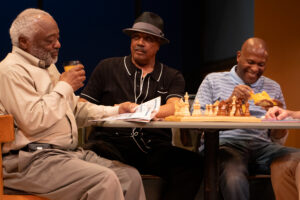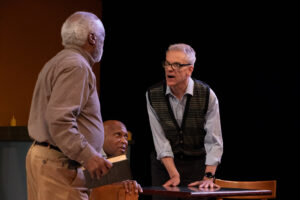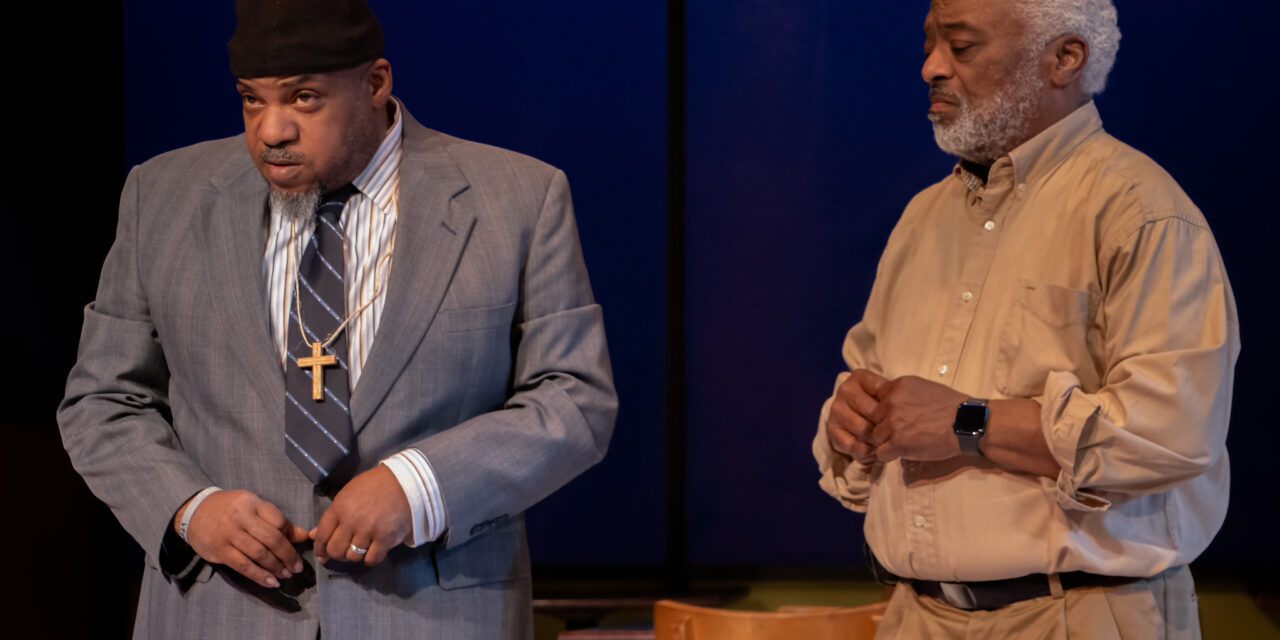
Photo Credit: Larente Hamlin, North Carolina Black Repertory
WINSTON-SALEM, NC – The North Carolina Black Repertory Company (N.C. Black Rep) created the Sylvia Sprinkle-Hamlin Rolling World Premiere Award to honor the late executive producer and co-founder of the organization that produces the International Black Theatre Festival biennially, as well as plays throughout the year. The purpose of the award is to discover and develop new African American theatre classics, while promoting collaboration between African American theatre companies.
NC Black Rep could not have chosen better than Coconut Cake by Melda Beaty, which is on stage now at Hanesbrands Theatre.
I was living in Eugene, OR when Mount St. Helens, a snow-capped mountain 275 miles north of us, erupted into ash- and lava-spewing chaos. Before that, I never imagined that a majestic landscape would radically transform itself in an instant. Some of the ash drifted down our way, and more of it traveled as far as New York City
Coconut Cake is like that. It’s a play that reveals the explosive feelings that dwell just below the cool personae that people can present to the world.
Four men, mostly retired, meet daily at a McDonald’s in Chicago to play chess, brag, gossip, commiserate, and generally palaver. The routine is the same every day, ritual-like in its predictability.
Even the interruptions are expectable. Every day, a beautiful woman drives up near the fast food restaurant, gets out of her car, and goes into a building. We don’t see the woman, any women, for that matter, although the female presence and influence is powerfully suggested throughout the show.
Whenever she drives up, the men drift downstage with mesmerized, near-ecstatic gazes on their faces, making comments on her pulchritude, of course. A clever undercurrent of choral music underscores their adoration, bringing a kind of worshipful feeling to the moment.
Director Nathan Ross Freeman uses smart staging like that and gets terrific performances from the actors, who are seasoned and well-equipped to handle this material.
Everyday, a street person whom the other men call Gotdamnit, stops the mysterious woman, says something to her, then joins the men inside and shakes them down for $1 apiece.
The first act shows the group of elder Black men as they want to be seen and as they are accustomed to being seen by one another.
Nathan Purdee, best known for his 20-year run on the popular soap operas, The Young and the Restless and One Life to Live, plays Joe, a self-styled real estate entrepreneur who has never married and never goes to church.
Purdee played Joe as loose-limbed and preening. He flashes his Rolex watch and his diamond rings and boasts about his many female conquests as he rattles his “blue diamonds” (Viagra, we think) in a small bottle.
Joe’s friend of 40 years, Eddie, played louche and loose, by Andre Minkins, is having a terrible time with his wife, Iris. Eddie has been unfaithful to her for years, but her anger at him has recently taken a violent turn, including waiting for him in the dark with a butcher knife.
Minkins was marvelous as Eddie, going through a wide range of emotional and physical changes. He may be the youngest of the group, still doing manual work, but something in his vitality is changing and not for the better.
Ralph Shaw’s Marty is the group’s peacemaker. A church deacon who has a “different kind of relationship“ with his wife, Mary, Marty seems to be the only one who really deserves the mantle of “elder.“ Marty is calm and easy-going, though he will preach a small sermon if he thinks it’s necessary. Shaw showed tremendous range in his character’s personal revelations in the second act.
Marty has brought another, seemingly unlikely, man into the group, his former brother-in-law, Hank, a White man, played by Philip Powell. Joe addresses Hank not by his name but by “Republican.“ Hank, who was married to Marty’s late sister, predictably bad-mouths Obamacare and makes tone-deaf comments about racial inequities. Joe, in turn, constantly baits Hank, causing Marty to come to his defense.
Powell used his slight frame to great effect as the seemingly milquetoast Hank. So it was all the more powerful when the worm finally turned in Act II.
Last but not least, Brian Cager as Gotdamnit is the spiritual architect of the show. An apparently aimless, unhoused man with mental-health issues, Gotdamnit speaks in oracular, if halting, cadences about his love of church and of Holy Communion. Cager made the role riveting, conjuring images of the bread and the wine in chant-like tones.
Gotdamnit tells the men that he (Gotdamnit) sits up high in God’s house so that he can see all the lights (the people). Some of the lights are dim, and some are bright. Some bring dimness into whatever situation they enter, and some bring brightness. He sees what others miss, including his own depth and secrets.

Photo Credit: Larente Hamlin, North Carolina Black Repertory
As with all of the unseen women in the play, Pat Brulée is a pivotal character. A stranger in town with a reputation for baking exceptional coconut cakes, Pat takes an apartment in one of Joe’s rentals. Her presence and her very full medicine cabinet have a galvanizing effect on the men.
The revelations in the second act bring down the walls among the men and introduce the possibility of real intimacy, authenticity, and connection, and maybe even some divine guidance.
Set and light design by Jennifer O’Kelly makes for smooth scene changes, and amplifies important moments. Frenchie LaVerne is the costume designer, making Pardee/Joe’s wardrobe especially expressive and fun. Sound design by Jasmine Williams includes those wonderful instances of soft choral music. Lovely additional music is by Jeremiah “Jazz” Salter. Kevin Hampton is the stage manager.
The assistant stage manager, H’arrya Canty, although dressed all in black, does not fade into the background. Her big personality turns her mundane role into an unexpected crowd pleaser as she doubles as a night janitor/restaurant worker.
Director Freeman is the co-founder of Authoring Action, a nonprofit arts education and outreach organization that develops youth authors. Freeman served as the first NC Black Rep Playwright-in-Residence from 1985-1995.
Playwright Beaty’s Front Porch Society enjoyed a mainstage production during the 2019 Black Theatre Festival. As part of her award for winning the Sylvia Sprinkle-Hamlin Rolling World Premiere Award, Coconut Cake will be produced at Westcoast Black Theatre Troupe in Sarasota, The Ensemble Theatre in Houston, Hattiloo Theatre in Memphis, and the St. Louis Black Rep.
Those audiences are in for a treat that will satisfy their hunger for sweet comedy as well as any longing they may have for deeper meaning, human kindness, and connection in an uncertain world.
Coconut Cake continues at NC Black Rep through Sunday, April 14.











